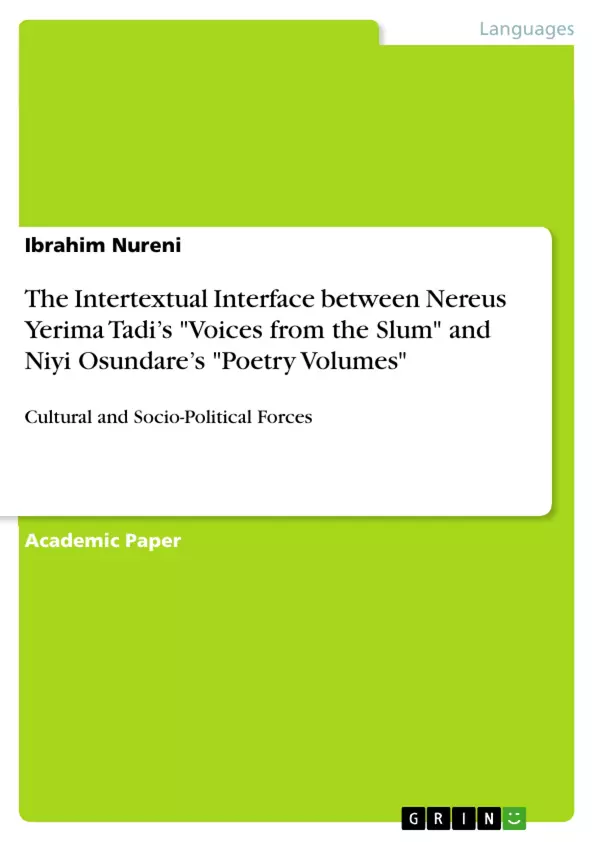This study examines the manner in which Tadi’s "Voices from the Slum" is a poetic offspring of Osundare’s poetry. Also seek to purport in this paper is the discursive matrix that the medium of gathering data for any literary construction is from literature itself but not the society. This study concludes that the indeterminacy of textual, discursive formation between Nigeria’s second generation and contemporary generation poets − as shown in the poetic semblance between Niyi Osundare’s poetry and Tadi’s "Voices from the Slum" − stands on the ideological benchmark which glorifies the assertion that poetry is considered as an interdependence or reworking of other poetic arts.
The figure-poet of Alter-Native poetry tradition in Nigeria, Niyi Osundare − whose ideas and thought-patterns have succeeded in popularizing a tradition of cultural essentialism − has made quite a number of contributions to the development of Nigerian poetry by domesticating the poetic form of obscured and fragmented ideas of Nigeria’s first generation poets into a poetic tongue that bears the language of both the colonizer and the colonized. His poetry volumes reject the impressionistic works of Nigeria’s first generation poets and provide sufficient resources in looking at the affairs of the nauseating socio-cultural and political system using nature-centered tropes as adaptation of cultural and natural propensities.
In light of this, Tadi’s poetic ingenuity bears the influential stamp of poetry that Osundare exerts on him. As he also embraces the lingua-cultural vista of his people, Tadi’s poetic form owes this paper a duty to have a deeper insight into the socio-political activities of Nigerian society, thereby negotiating the intertextual connectivity between Tadi’s "Voices from the Slum" and Niyi Osundare’s poetry.
Inhaltsverzeichnis (Table of Contents)
- Abstract
- Introduction
- Socio-Cultural and Political Deployment in Tadi's Voices from the Slum
- Socio-Cultural and Political Deployment in Osundare's Poetry
- Negotiating Boundaries: Tadi's Voices from the Slum versus Osundare's Poetry
- Summary and Conclusion
- Works Cited
Zielsetzung und Themenschwerpunkte (Objectives and Key Themes)
This study explores the intertextual relationship between Nereus Yerima Tadi's Voices from the Slum and Niyi Osundare's poetry. The aim is to understand how Tadi's work builds upon and draws inspiration from Osundare's influence, particularly in its socio-cultural and political themes.
- Intertextuality in Nigerian Poetry
- Influence of Niyi Osundare on Contemporary Poetry
- Socio-Cultural and Political Representations in Poetry
- The Role of Language and Tradition in African Literature
- The Interplay of Modernism and Oral Traditions in Nigerian Poetry
Zusammenfassung der Kapitel (Chapter Summaries)
- Abstract: The abstract provides an overview of the study's focus, highlighting the intertextual connections between Tadi's Voices from the Slum and Osundare's poetry, specifically in terms of their socio-cultural and political themes.
- Introduction: The introduction introduces Niyi Osundare as a prominent figure in Nigerian poetry, highlighting his contributions to the "Alter-Native poetry tradition." It also introduces Nereus Yerima Tadi as a younger poet whose work shows the influence of Osundare's style and themes.
- Socio-Cultural and Political Deployment in Tadi's Voices from the Slum: This chapter explores the socio-cultural and political context that informs Tadi's poetry, focusing on how his work reflects the complexities of Nigerian society. It highlights the importance of cultural and traditional elements in Tadi's poetry, such as the use of local language and imagery.
- Socio-Cultural and Political Deployment in Osundare's Poetry: This chapter examines Osundare's poetry in terms of its socio-cultural and political themes, emphasizing his use of nature-centered tropes and his critique of the existing social and political system.
- Negotiating Boundaries: Tadi's Voices from the Slum versus Osundare's Poetry: This chapter analyzes the intertextual connections between Tadi's and Osundare's work, highlighting how Tadi's poetry draws on Osundare's style and thematic concerns.
Schlüsselwörter (Keywords)
This study examines the intertextual connectivity, influence, and reworking of themes and styles in Nigerian poetry. Key terms include: intertextual connectivity, Nigerian poetry, interdependence, reworking, socio-cultural and political deployment, Alter-Native poetry tradition, oral aesthetics, cultural essentialism, and traditional oral arts.
Frequently Asked Questions
What is the intertextual link between Tadi and Osundare?
Tadi's "Voices from the Slum" is analyzed as a poetic offspring of Niyi Osundare's work, sharing nature-centered tropes and socio-political themes.
Who is Niyi Osundare in Nigerian literature?
Osundare is a central figure of the "Alter-Native" poetry tradition, known for domesticating poetic forms and focusing on socio-cultural essentialism.
What are the main themes in Tadi's "Voices from the Slum"?
The collection explores the nauseating socio-political system of Nigeria, urban poverty (slums), and cultural identity using local imagery.
How does African oral tradition influence this modern poetry?
Both poets rework traditional oral arts and aesthetics into written form, creating a "poetic tongue" that bridges indigenous and colonial languages.
What is the "Alter-Native" poetry tradition?
It is a movement in Nigerian poetry that rejects the obscured ideas of earlier generations in favor of accessible language and nature-centered tropes to address social issues.
- Citation du texte
- Ibrahim Nureni (Auteur), 2019, The Intertextual Interface between Nereus Yerima Tadi’s "Voices from the Slum" and Niyi Osundare’s "Poetry Volumes", Munich, GRIN Verlag, https://www.grin.com/document/460933



